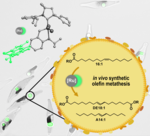-
-
-
-
-
-
-
-
-
-
-
-
-
-
-
-
-
Innovative materials - 14/06/2023

Conserving wood by producing furniture and other objects from wood-based materials with the help of microorganisms? That is exactly what a team of researchers from the University of Freiburg and the Leibniz Institute for New Materials (INM) in Saarbrücken is working on in the DELIVER project. The aim is to create a database of materials with a broad range of controllable properties for various applications that can be produced from wood waste.
https://www.biooekonomie-bw.de/en/articles/news/reinventing-wood-programmable-bacteria
-
-
-
-
3D-Thermocell project - 17/05/2023

Replacing plastic – for example in packaging – is not that easy but nevertheless urgently needed. In the 3D-Thermocell project, researchers at DHBW Karlsruhe are currently developing new plastic substitute products made of thermoformable paper as a renewable resource, which should be cheap and light and easy to dispose of along with waste paper. The characterisation and application of demonstration models will start soon.
https://www.biooekonomie-bw.de/en/articles/paper-instead-plastic-sustainable-packaging-good-conscience
-
Press release - 16/05/2023
This year's Venice Architecture Biennale sees itself as a "Laboratory of the Future". Bio-composites are not just dreams of the future in architecture. The German Institutes of Textile and Fiber Research (DITF) have developed a sustainable material for support profiles and connecting nodes, which will be on display at Palazzo Mora during the Biennale from May 20 to November 26.
https://www.biooekonomie-bw.de/en/articles/pm/bioverbundwerkstoff-auf-der-architektur-biennale-venedig
-
Diatoms as a biorefinery - 05/05/2023

Renewable raw materials that can be used as alternatives to fossil resources already exist. However, to turn them into everyday products, plant oils and other renewable raw materials not only have to be extracted, but often have to undergo complex chemical processing. Researchers at the University of Konstanz have now converted microalgae cells into tiny refineries to produce and upgrade raw materials, creating a supply of sustainable chemicals.
https://www.biooekonomie-bw.de/en/articles/news/microalgae-sustainable-chemical-production-mini-factory
-
-
Website address: https://www.biooekonomie-bw.de/en/search


